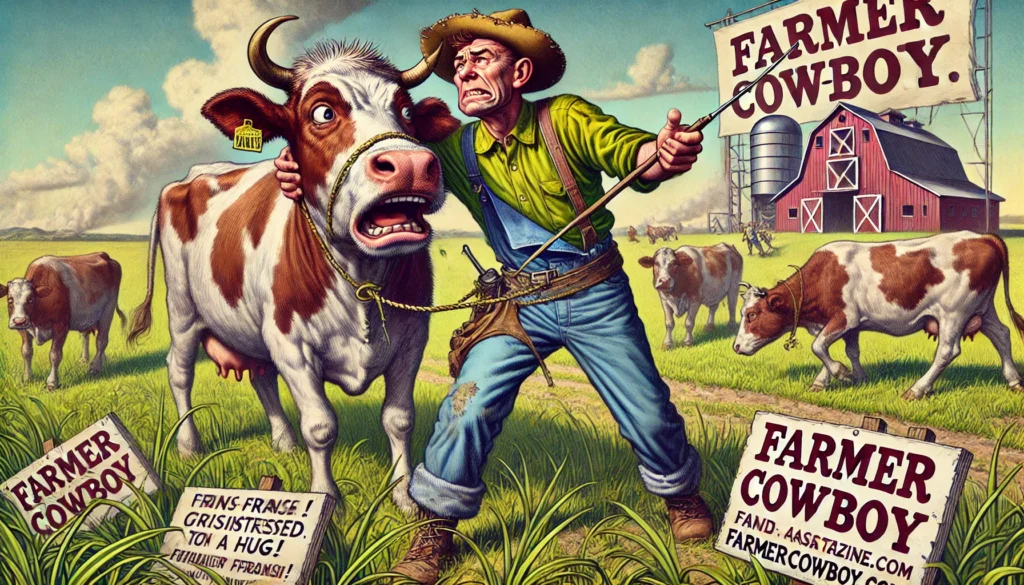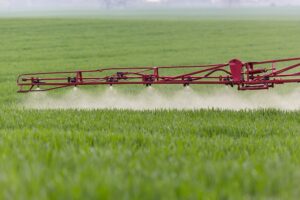
FarmerCowboy.com A vivid and detailed illustration in the style of Mad Magazine but branded for farmercowboy.com . The scene shows a farmer in a large field arms outst.webp.webp
Lubbock, TX — It’s official: cows across the nation have spoken—or rather, mooed—and the verdict is in. Hugs? Not interested. As farmers across the country face declining sentiment, they’re learning the hard way that the bovine community isn’t exactly what you’d call “touchy-feely.”
The latest Cow Sentiment Survey conducted by FarmerCowboy.com revealed a shocking revelation: despite farmers’ best efforts to bond with their cattle, 82% of cows surveyed remained emotionally indifferent, while 18% stared blankly into the distance, chewing cud. The emotional crisis has sent waves of disillusionment through the agricultural sector, raising questions like: Can you love a cow if it doesn’t love you back?
The Unhuggable Cow Conundrum
Farmers have long assumed that raising cows was a two-way relationship—providing hay, shelter, and the occasional scratch behind the ears would naturally result in some emotional reciprocity. Alas, farmers are now finding out that their cows are about as emotionally responsive as a garden fence.
Take Farmer Bill, for example, who attempted to give his prized Holstein, Daisy, a hug after a long day of milking. “I just wanted a little gratitude, you know? Maybe a nuzzle or a lick,” said Bill, tears welling in his eyes. “Instead, she gave me the cold shoulder. Literally. She turned away so fast, I thought I was about to get a tail slap.”
Bill’s experience is hardly unique. Reports from farmers across the country suggest that cows are distancing themselves emotionally—some refusing to even make eye contact. Veterinarian Dr. Moo-lyssa McMoo, an expert in bovine psychology, explains: “Cows have been practicing emotional detachment for centuries. They are fiercely independent creatures. Their relationship with farmers is transactional: you provide the food, and they’ll provide the milk, but that’s where the relationship ends.”
Cows as the Original Social Distancers
If you thought cows were just “staying distant” during the pandemic, think again. They’ve been perfecting the art of emotional detachment since long before the phrase “six feet apart” was even coined.
Dr. McMoo goes on to suggest that cows may be the originators of social distancing. “They’ve been doing this for thousands of years. The second you get within five feet of a cow, it knows. Their natural instinct is to create emotional space—kind of like a teenager rolling their eyes when you try to have a conversation.”
When Your Best Friend’s a Cow, But She Ghosts You
Farmers have been reporting a disturbing new trend in recent years: cows not only ignore them during day-to-day farm activities, but also “ghost” them at crucial emotional moments. One farmer in Windthorst, TX, reported trying to bond with his cow after a particularly difficult harvest. “I was standing there, talking about my day, and halfway through, she just walked away. Didn’t even moo in acknowledgment. It’s like I don’t exist to her.”
Farmers, often accustomed to being the strong, silent type themselves, are finding the experience humbling. “I thought we had something, you know? Years of working together, raising calves, surviving droughts… but I guess it meant nothing to her,” said Jim Stevens, a rancher from the Red River Valley. “She’s emotionally unavailable.”
The Udderly Uninterested
As farmers adjust to the reality that cows are “udderly uninterested” in affection, some are turning to social media for solace. A viral post by a Wyoming rancher showed a cow sitting just inches away from its farmer, staring blankly while the caption read: “Tried to give her a hug, she gave me nothing. This is why we can’t have nice things.”
The post has sparked widespread conversation about the emotionally aloof nature of cows. “The fact is,” said Dr. McMoo, “cows just aren’t wired for emotional intimacy. Sure, they’ll let you milk them, feed them, and tend to their every need, but that’s because they see you as the help, not as a companion.”
The Real Meaning of “Moo”
Animal behaviorists are now revealing that the iconic “moo” sound has less to do with communication and more to do with indifference. A recent study by the Bovine Linguistics Institute found that “moo” roughly translates to “I’m eating, go away.” The research suggests that for years, farmers have misunderstood their cows’ attempts at communication.
“It’s not a cry for help, it’s a cry for personal space,” says linguist Dr. Beauford Haystack. “When cows moo, they’re saying, ‘Stop trying to bond with me. I have no emotional investment in this relationship.’”
Cows Are Just In It for the Grass
It seems cows view their farmers the way humans view their smartphones: useful, but not something you want to hug. Rancher Jess Martin from Central Valley, CA, lamented the realization. “I thought we were partners, you know? I gave them fresh grass, clean water, and everything they needed. Turns out, they were just in it for the food.”
Cows, apparently, are no different than the friend who only calls when they need help moving. “I thought Daisy appreciated all I did for her,” Jess continued, “but when I tried to pet her, she flicked her ear like I was a fly. I get it now. She’s just here for the grass.”
Hugs vs. Milk Production
In an unexpected twist, research has shown that there is no correlation between hug frequency and milk production. In fact, cows hugged too often tend to produce slightly less milk, possibly due to stress from being forced into emotional interactions they don’t want.
Dr. McMoo, who conducted the study, stated, “Cows aren’t really into public displays of affection. They’re more about their personal bubble. If you breach that bubble, don’t expect an increase in milk output. In fact, you might want to duck—the tail slap can sting.”
Cows Are Anti-Affection but Pro-Personal Space
Despite farmers’ best efforts to create a friendly, hands-on atmosphere, cows have consistently demonstrated that they prioritize personal space above all else. It’s been likened to a workplace where the boss keeps trying to initiate hugs, but the employees just want to do their job and go home. “It’s about boundaries,” explained farmer Grace from Plymouth, WI. “You try to bond, but they’ve clearly set up emotional fences taller than any barbed wire I’ve ever put up.”
Farmer Support Groups for Rejected Hug Attempts
In response to the emotional toll that rejection has taken on farmers, support groups are springing up across the country. “We’re here to help,” said the founder of Hug-Free Farms Anonymous, a new nonprofit dedicated to helping farmers cope with bovine coldness. “We offer a safe space for farmers to share their feelings of rejection without judgment.”
Farmers gather in these meetings to share stories of unrequited affection, swapping tales of cows that refused to be petted and calves that walked away mid-nuzzle. “It helps to know we’re not alone,” said participant Pete from Cody, WY. “Sometimes you just need to hear that someone else’s cow also gave them the side-eye during a hug attempt.”
Cows Have No Time for Human Nonsense
The concept of “moo-d swings” has taken on new meaning as cows continue to reject the advances of farmers seeking emotional connection. Farmers are learning the hard way that cows are, in fact, busy creatures—albeit busy standing, chewing, and staring into the middle distance.
“When you think about it,” said local rancher Joe Blake, “they’re always busy chewing. They’ve got, what, four stomachs? That’s a full-time job. I can’t expect them to have time for my emotional needs when they’re working through that kind of digestive system.”
It’s Not You, It’s Moo
For farmers seeking closure, the phrase “It’s not you, it’s moo” has become a common refrain. It helps to remind them that the rejection is not personal—it’s just a fundamental aspect of cow nature. “I used to think my cows didn’t like me,” said farmer Dan from 6666 Ranch, “but now I know, they just don’t like anyone.”
Farmers Versus the Strong, Silent Type
As ranchers adjust to the reality that cows are, at their core, the strong, silent type, many are beginning to reevaluate their expectations. “I always thought of Daisy as my quiet partner,” said Grace from King Ranch. “Turns out, she’s more like a distant colleague who won’t respond to my emails. But that’s okay—I’ve made peace with it.”
The Failed Farmer-Cow Relationship
The collapse of the farmer-cow emotional relationship is being dubbed The Great Barnyard Breakup of 2024. Across the country, farmers are filing emotional separation papers, declaring their cows emotionally unavailable. “I gave her my best years,” sobbed one farmer, clutching a bucket of feed. “But all she ever gave me was milk… and even that felt transactional.”
Bovine Breakups: No Texts, Just Hoofprints
Unlike human relationships, cows don’t leave behind teary goodbye letters or awkward text messages—they just walk away, leaving hoofprints in the mud. “I came to the barn the other morning, ready to bond,” said farmer Bob, “but all I found were hoofprints leading to the far corner of the pasture. It was like she didn’t even care.”
Cow-tastrophe: Farmers’ Emotional Investment Not Paying Off
At the end of the day, farmers are coming to terms with the reality that their emotional investment in cows is, to put it bluntly, a bad return on investment. “I’ve been trying to bond with Bessie for five years now,” said Pete from Stephenville. “I’ve fed her, cared for her, and what do I get in return? A blank stare and a pile of manure. It’s time to cut my losses.”
Despite the cold hard truth that cows just aren’t into hugs, farmers are finding solace in each other. Support groups, online forums, and even bovine-themed self-help books are popping up across the country. Perhaps the next great farming innovation won’t be about equipment or crop yields—it’ll be about emotional resilience in the face of cow rejection.
In the meantime, farmers everywhere are learning a valuable lesson: if you’re looking for love, maybe it’s time to consider chickens.

Originally Published at FarmerCowboy.com
2024-09-04 09:29:57
Karl Hoffman is a distinguished agriculturalist with over four decades of experience in sustainable farming practices. He holds a Ph.D. in Agronomy from Cornell University and has made significant contributions as a professor at Iowa State University. Hoffman’s groundbreaking research on integrated pest management and soil health has revolutionized modern agriculture. As a respected farm journalist, his column “Field Notes with Karl Hoffman” and his blog “The Modern Farmer” provide insightful, practical advice to a global audience. Hoffman’s work with the USDA and the United Nations FAO has enhanced food security worldwide. His awards include the USDA’s Distinguished Service Award and the World Food Prize, reflecting his profound impact on agriculture and sustainability.


